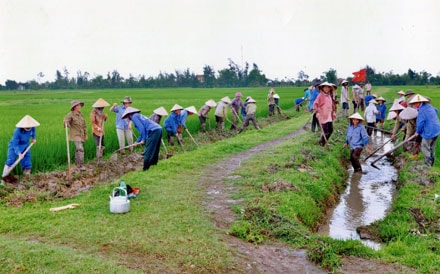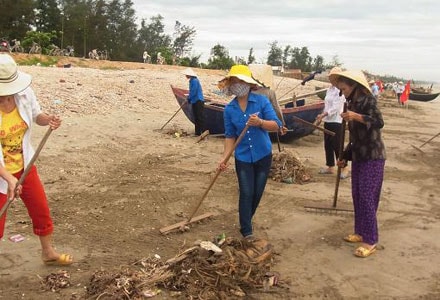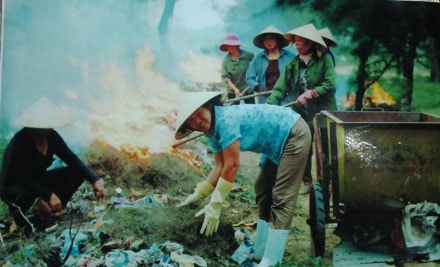Join hands to improve the rural environment
(Baonghean) -One of the 19 new rural criteria for wards and communes in the North Central region issued by the Prime Minister is to ensure environmental sanitation, "waste and wastewater are collected and treated according to regulations". Joining hands to build new rural areas, the Women's Union at all levels has launched the movement "Women with environmental protection".
Along with the movement's launch, many environmental protection clubs in Nghe An were established, attracting a large number of members to participate and initially achieving remarkable results...
It has become a tradition that every Saturday, the Women's Union of Thanh Linh commune (Thanh Chuong) organizes for women in the whole commune to sweep and clean the environment of village roads and alleys. After the gong sounds, women are present in large numbers at the village cultural house, each with a task, first of all, collecting and processing waste in the house and garden; sweeping inter-village and inter-commune roads; clearing drainage ditches in alleys and alleys... Thanks to the participation of women, the landscape and environment in villages and alleys are always airy and clean...

Hung Nguyen women join forces to do internal irrigation
Women of Quynh Nghia commune (Quynh Luu) joined forces to clean up the coastal environment.
The waste collection team of Phuc Tho commune (Nghi Loc) is run by women.
At the Women's Association of Tan Yen hamlet, Tan Phu commune (Tan Ky), in August 2010, the "Waste classification at source and limit the use of plastic bags" club was established with 20 members participating. This is a form of social activity to protect the environment, take care of family and social health. Once a month, the waste classification club organizes activities to discuss topics such as: Waste classification at households; food safety and hygiene issues, livestock barn hygiene; how to handle feces, the importance of washing hands with soap, practicing proper hand washing... Each club member is equipped with 2 waste bins to classify organic waste, inorganic waste and a plastic basket to go to the market. After nearly 1 year of operation, now, not only the members of the club but also the people around have become aware of waste classification, using organic waste to compost fertilizer for plants; Use banana leaves, dong leaves to wrap food, use shopping baskets instead of plastic bags, contributing to reducing the amount of inorganic waste released into the environment.
Nghi Xuan Commune (Nghi Loc) has been considered a locality that has done a good job of environmental sanitation for many years. Although it is a rural area, the commune has established waste collection teams managed by the Women's Union. Three times a week, the waste collection teams go to each house and each hamlet to collect waste, then transport it to the commune's waste collection site and sort it for treatment. Therefore, there is no longer the scene of littering, the habit of "Clean house, clean alley" has been formed...
Up to now, the whole province has 15 "Women with the environment" clubs; more than 600 women's groups "Self-managed waste collection"; 100% of communes direct the construction of the "Family of 5 no, 3 clean" model. In addition, the Women's Union at all levels has promoted communication work on environmental protection through forms such as: Organizing contests "Learning about the environment"; organizing forums "Environmental protection in the period of promoting industrialization and modernization of the country", opening training courses on environmental sanitation... to raise awareness of environmental protection for women; thereby changing the habit of littering; forming environmental protection behavior...
In parallel, the Association at all levels effectively implemented the sanitation revolving fund, clean water fund... Thanks to that, many member families built "Improved energy-saving kitchens to protect the environment"; clean water works; built biogas tanks... contributing to raising the number of rural families with sanitary facilities to 65%.
Through practical and effective models, Women's Unions at all levels have contributed to raising awareness among women and the community about environmental protection; forming habits and behaviors of environmental sanitation starting from clean houses, clean kitchens, clean alleys to clean villages, hamlets, and clean living environments; contributing to perfecting the criteria for new rural areas.
Duy Nam






